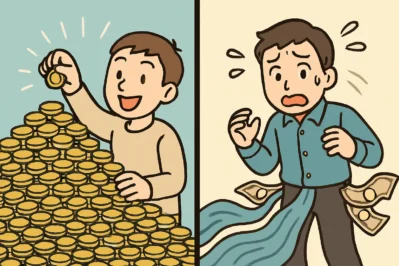Hello! This is [Maeil Hangul], here to upgrade your Korean skills!
Today, we’re diving into a very practical and trendy topic in Korea: planning your household budget (가계 예산). Whether you’re saving up for a trip to Seoul or just want to manage your daily expenses, these expressions will be incredibly useful. Lately in Korea, with rising prices, many young people are participating in the “No-Spend Challenge” (무지출 챌린지) and using “App-Tech” (앱테크) to save money. Let’s learn the essential phrases to talk about this hot trend!
Core Expressions for Smart Spending
Here are the key phrases you need to sound like a native when talking about money.
1. 티끌 모아 태산 (tikkeul moa taesan)
* Pronunciation [Romanization]: Tik-keul mo-a tae-san
* English Meaning: “Gathered dust becomes a great mountain.” (Similar to “Many a little makes a mickle” or “Look after the pennies, and the pounds will look after themselves.”)
* Detailed Explanation: This is a famous Korean proverb (속담). 티끌 means a tiny speck of dust, and 태산 refers to a huge mountain. It emphasizes that by saving even very small amounts of money consistently, you can accumulate a large sum over time. It’s a very positive and encouraging expression used when talking about the power of saving.
2. 아끼다 (akkida)
* Pronunciation [Romanization]: A-kki-da
* English Meaning: To save; to be frugal with; to cherish.
* Detailed Explanation: This is a fundamental verb for anyone wanting to budget. It’s more versatile than just “to save money.” You can use 아끼다 for money (돈을 아끼다), water (물을 아끼다), time (시간을 아끼다), or anything you use sparingly and carefully. It implies a sense of valuing something and not being wasteful.
3. 돈을 물 쓰듯 쓰다 (doneul mul sseuddeut sseuda)
* Pronunciation [Romanization]: Don-eul mul sseu-deut sseu-da
* English Meaning: To spend money like water.
* Detailed Explanation: This is a common idiom (관용구) used to describe someone who spends money carelessly and excessively. 물 쓰듯 literally means “as if using water.” It has a negative nuance, suggesting wasteful behavior. It’s the complete opposite of 아끼다.
Example Dialogue
Let’s see how these expressions are used in a real conversation between two friends, Minjun and Sora.
A (Minjun): 소라 씨, 요즘 커피도 안 사고 정말 절약하네요!
Sora, you’re not even buying coffee these days. You’re really saving!
B (Sora): 네, ‘무지출 챌린지’ 중이에요. 돈을 좀 아껴야 해요. 티끌 모아 태산이잖아요!
Yep, I’m doing the ‘No-Spend Challenge’. I need to save some money. You know, many a little makes a mickle!
A (Minjun): 와, 대단해요. 저는 항상 돈을 물 쓰듯 써서 걱정인데…
Wow, that’s amazing. I’m worried because I always spend money like water…
B (Sora): 괜찮아요! 지금부터 시작하면 돼요. 같이 해볼래요?
It’s okay! You can start from now. Want to try it together?
Culture Tip & Trend Deep Dive
In Korea, especially among the Z generation, being frugal is cool! Here’s how today’s lesson connects to the latest trends:
- The ‘No-Spend Challenge’ (무지출 챌린지): This is a popular challenge on social media where people try to spend absolutely no money (except on essentials like transportation) for a day, a week, or even a month. They share their tips and results online, encouraging each other. It’s a fun, gamified way to 아끼다.
- App-Tech (앱테크): This term is a combination of ‘Application’ and ‘Jae-tech’ (재테크), the Korean word for financial management. It refers to the practice of using smartphone apps to earn small rewards, like points for walking, watching ads, or completing surveys. This is the perfect modern example of 티끌 모아 태산 in action! If you mention App-Tech, your Korean friends will be very impressed.
Wrap-up & Practice Time!
Great job today! We learned some fantastic expressions for talking about budgeting like a local: the hopeful proverb 티끌 모아 태산, the essential verb 아끼다, and the cautionary idiom 돈을 물 쓰듯 쓰다.
Now, let’s test your knowledge!
Practice Problem: Fill in the blank with the most suitable expression from today’s lesson.
My friend wants to buy a new laptop, but he spends too much on games and clothes. I told him, “그렇게 (__________)으면 노트북을 절대 못 살 거야!” (If you ____________ like that, you’ll never be able to buy a laptop!)
Leave your answer and try making your own sentence with one of today’s expressions in the comments below! Are you good at saving money? Tell us your story






